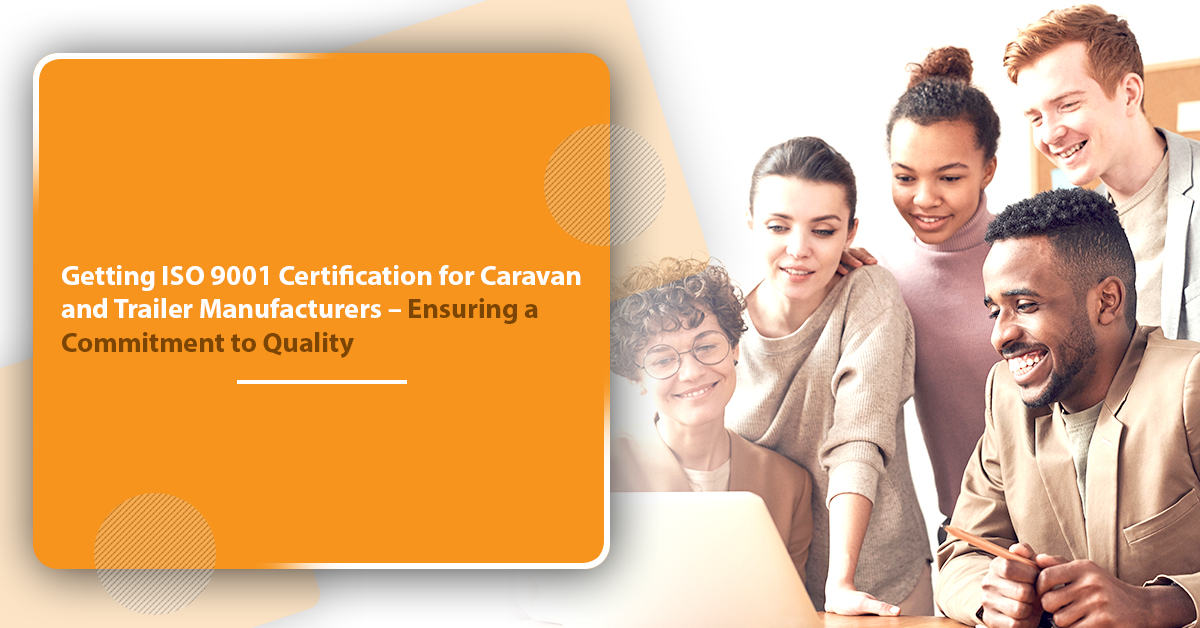
Road Vehicle Standards (RVS) legislation are prepared and enforced by the Australian Government, through the Department of Infrastructure, Transport, Regional Development and Communications, to ensure safe and environmentally-friendly road vehicles. In August 2021, a document was issued by this department named “Guide to Vehicle Type Approvals for Low ATM trailers – 4.5t ATM (Aggregate Trailer Mass) or less”. Under the legislation, the vehicles should get a vehicle type approval by meeting certain criteria. To meet the criteria, the manufacturers of vehicles should provide relevant documents and information that demonstrate compliance.
As part of the required documentation a Quality Management System (QMS) is required. Manufacturers may either develop a QMS to the international QMS standard ISO 9001 and get it certified by an accredited certification body, or the abovementioned Guide gives a separate set of QMS criteria in the appendices that must be met. This aforementioned QMS criteria has similar requirements to ISO 9001 but the documentation will be checked for compliance by the government department.
The criteria for designers and manufacturers are different to those that do not design and manufacture. Those that do not design and manufacture will need to have access to the documentation and information from the designer and manufacturer. Proof of access to the relevant information as specified in the Guide must be through a commercial agreement, contract or written advice from the designer and manufacturer. This information includes access to the designer and manufacturers’ QMS.
So, why should caravan and trailer manufacturers get ISO 9001 certification? This blog attempts to address this.
Achieving the ISO 9001 standard helps your trailer manufacturing company have a strong quality management framework. Here is how the standard intends to help manufacturers in many ways to deliver superior quality trailers.
Every business implements a QMS for the quality assurance of their processes, products and services, but there can and will be big differences on how the QMS is structured or defined. To ensure consistency, the ISO 9001 standard calls for the implementation of a well structured and defined QMS. In addition, using ISO 9001 to prepare your QMS means that it will be recognised nationally and internationally.
Here are some requirements that help you have a strong and functional QMS:
Manufacturers should briefly describe the scope of their QMS, or in other words, what the QMS covers, e.g., design and manufacture of industrial trailers under the vehicle category code TC-Medium Trailer. The scope should include the type of trailers being manufactured by your company.
A part of the QMS is about outlining the roles and tasks of employees in the design, production and other stages of manufacturing. To assure the quality, safety and reliability of the trailers, manufacturers should have supervision over all the stages of the process.
ISO 9001 requires that Top Management assign and communicate roles and responsibilities within the business. A popular method for addressing this requirement could be the creation of job or position descriptions. These should be communicated to the relevant employees. Procedures should also describe roles and responsibilities. An organization chart should be developed. Even small organizations should have an organization chart.
ISO 9001 now refers to purchasing as “Control of externally provided processes, products and services”. Purchasing is important because the business is relying on the quality of another party, and therefore potentially loses some control over it. However, while suppliers are responsible for their own quality to an extent, ISO 9001 requires that the business must maintain overall responsibility for product quality.
To ensure quality, the business must determine the controls that need to be applied to the supplier and the product/service, and then ensure that those controls are implemented. The specifications and controls identified by the business must be clearly communicated to the supplier so that the supplier can understand the requirements.
Suppliers must be able to provide the product/ perform the required service. The business should take all necessary precautions to ensure that all requirements can be met by the supplier including timing, capabilities, competencies, etc.
The products /services provided by the supplier must be checked by the business to ensure overall quality is maintained.
Where appropriate, procedures for purchasing should be developed, implemented, and communicated to personnel.
To ensure traceability and that specifications are clear, documentation and records should be created and retained. The type of documentation and records will differ depending on many factors including customer requirements, industry, cost, importance to quality, etc.
This is the key part of the ISO 9001 where businesses must outline processes to be used for the design and manufacturing of trailers. Businesses should document the design process including what the requirements for the trailer are, design team, design planning, the design process, validation of the design and design changes. Designs must be manufacturable, meet the requirements, and must be easily understood by personnel and suppliers.
Another important requirement of ISO 9001 is continuous periodic evaluations of production to ensure a timely and quality outcome. A responsible person from the quality management team or a manager should undertake the task of reviewing progress and quality, and then report any discrepancies identified. For instance, if it was found that some trailer components will be delayed, the delay will need to be addressed, including where appropriate, determining an alternative source so the trailer can be delivered in a timely manner.
There are many other ISO 9001 requirements that will help you deliver a trailer that meets the customers’ requirements and Road Vehicle Standards.
The above reasons should help you see that a trailer manufacturer with ISO 9001 certification will help to deliver outcomes that will meet the standards and the requirements of customers. If you are a trailer manufacturer, then consider getting ISO 9001 certification to underscore your focus on quality and commitment. From managing the design processes to controlling manufacturing processes, from assigning responsibilities to personnel to finding and engaging the right supplier, there are many aspects of trailer manufacturing that an ISO 9001 QMS helps to take care of.
When you hold ISO certification, it ensures that your QMS is reliable and supports the claim of having control over all processes of manufacturing. You are also able to provide appropriate documentation when applying for a vehicle type approval. Many other trailer manufacturers have already achieved ISO certification, and you can also.
If you need any assistance to achieve the certification of your QMS, contact Compliancehelp in Australia! We are a leading ISO certification consultancy and are passionate about assisting businesses to get certified to the relevant quality assurance standards.

Get connected with us on social networks!